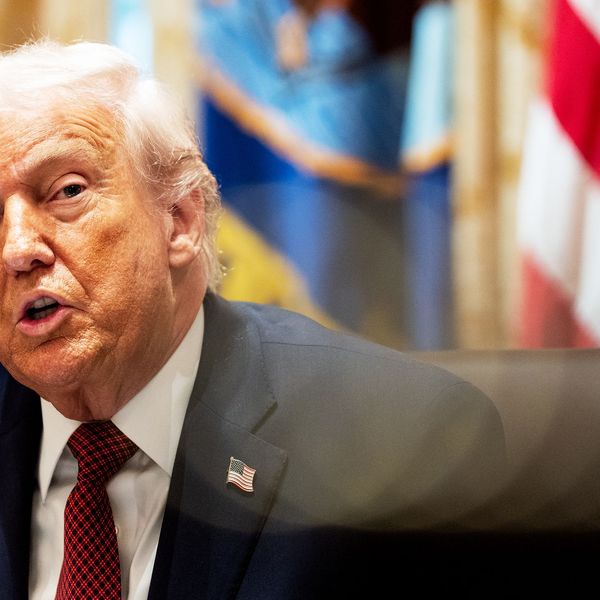When Donald Trump announced his latest threats against Iran on Rush Limbaugh's show last week, it was unclear whether he or his steroids were talking. Even this president rarely uses language like, "If you f**k around with us, if you do something bad to us, we are going to do things to you that have never been done before" in announcing foreign policy.
The possibility of an October Surprise looms over every presidential election. This year, twenty-some days out from the election they're looking likely to lose, with more than 215,000 people across the United States dead from the pandemic, the White House transformed into the latest coronavirus hot spot, the economy still in free-fall, and the commander in chief loaded up on drugs, the Trump administration's latest--harsh new sanctions on Iran--don't look so surprising at all. The political use of the term October Surprise, after all, started with the Iran hostage crisis of 1980.
But this not-so-shocking surprise is actually incredibly dangerous and reckless for the future, and incredibly cruel, heartless, indeed sadistic right now. The new economic sanctions will shut down the last 18 Iranian banks still able to finance the import of desperately needed humanitarian goods, including medicine desperately needed during the Covid-19 crisis, and even basic foodstuffs. Earlier U.S. sanctions had already brought massive suffering to Iranians. At the beginning of April, as the pandemic was at its height, Sen. Chris Murphy (D-Conn.) acknowledged that "U.S. sanctions are stopping medical equipment from being sent to Iran. As a result, innocent people are dying."
The U.S. claims this latest escalation of its "maximum economic pressure" sanctions campaign will force Iran to the negotiating table. But years of punishing the entire population of 80 million Iranians has shown this is almost certain to fail to achieve stated U.S. goals--and even if it succeeded, the human price paid in hunger, lack of medicine during a raging pandemic, the death of children and other vulnerable people, is simply far too high.
During an earlier U.S. sanctions campaign against Iran, Rep. Brad Sherman (D-Calif.) blithely noted that "critics also argued that these measures will hurt the Iranian people. Quite frankly, we need to do just that." Sherman, who is now running to chair the House Foreign Affairs Committee, had the audacity to compare Washington's brutal sanctions against Iran to the global movement against apartheid South Africa in the 1980s. In so doing Sherman deliberately ignored the critical distinction: the vast majority of South Africans supported anti-apartheid organizations that called on the world to impose sanctions, accepting the consequences and linking those external sanctions to their broader national strategy for liberation and freedom. In Iran, people and organizations fighting to broaden democratic rights in Iran are calling desperately for an end to sanctions--because the sanctions are killing them.
This newest punishment will only exacerbate the devastating impact of the broader sanctions regime the U.S. has imposed on Iran for years. While the State Department brags that it "continues to stand with the Iranian people" and that "exceptions for humanitarian exports to Iran ... remain in full force" the reality is that existing economic sanctions, despite those exceptions, have destroyed Iran's economy and the lives of most of the 80 million Iranians, especially the poorest and most vulnerable sectors among them.
The latest escalations in broad U.S. economic sanctions against Iran began with Trump's pullout from the 2015 the Joint Comprehensive Plan of Action (JCPOA), also known as the Iran nuclear deal. Despite virtually unanimous international and U.S. intelligence agreement that the JCPOA was working--Iran was not building nuclear weapons, UN inspectors remained on the ground, UN sanctions had been ended--Trump made clear that abandoning Obama's deal was top of his agenda. In May 2018 he pulled out of the deal and imposed a host of crippling new unilateral sanctions against Iran.
The other signatories--Germany, France, Britain, China, Russia, and the European Union--all opposed the U.S. pull-out, as did the UN Security Council which had endorsed the deal and established a monitoring agency to guarantee its implementation. The biggest U.S. demand the Council had accepted what became known as "snap-back," by which any signatory could report an Iranian violation of its nuclear obligations, and if the UN monitors confirmed the claim, the UN sanctions that had been lifted would automatically "snap-back" into place. With the U.S. having abandoned the deal, and U.S. sanctions rapidly escalating, European countries made some efforts to protect Iran from the impact of those new sanctions. But they largely failed, and eventually Iran took some calibrated steps in nuclear power enrichment beyond what was permitted in the JCPOA.
In early August, Washington tried to convince the Security Council to extend some conventional arms restrictions on Iran that were set to expire. They had nothing to do with nuclear weapons, and the rest of the Council (with the exception of U.S.-dependent Dominican Republic) unanimously refused. A week later, in an effort to escalate "maximum pressure" on Iran even further, Secretary of State Mike Pompeo announced he was invoking the "snap-back" procedure and demanded the restoration of UN sanctions against Iran. The rest of the Security Council (again without the Dominican Republic) made clear that since the U.S. had renounced the agreement, it no longer had standing to make such a demand.
Pompeo's response was that since the U.S. had originally signed the treaty, Washington still had all the rights of signatories--despite having officially withdrawn, ending all its obligations. He then simply announced that UN sanctions were now back in force, though no other country agreed.
And then came the latest U.S. sanctions. Along with new suffering for the Iranian people, the danger could quickly escalate if, for example, the U.S. decided to forcibly board and "inspect" a ship it might claim was carrying goods to or from Iran. If Iran resisted, a serious military conflict could erupt. It is this threat of a deliberate U.S. provocation, aimed at pushing Iran to respond militarily thus giving Iran hawks in Washington an excuse to react with greater military force just in time for pre-election strutting and boasting by the commander in chief, that could shape an incredibly dire and dangerous October surprise.
So far, Iran has not taken Washington's bait. It has reacted to U.S. provocations--including the assassination of powerful Iranian political and military leader General Qasem Soleimani in January of this year--with significant caution. But Iran has its own elections scheduled in June, and there is growing pressure on the leadership for more decisive action.
Iran may also be holding back in anticipation of a change in the White House. Biden has not called for ending sanctions in Iran, but he has made clear that he would "offer Tehran a credible path back to diplomacy," return to the JCPOA, end the Muslim ban, and work to end the Yemen war. While Biden's position is not nearly as strong as it needs to be to end the assault on ordinary Iranians' lives, there is no question it challenges some of the worst aspects of existing policy. This shouldn't be surprising - the JCPOA represented the high point of Obama's foreign policy achievements, and since Biden's credibility is fundamentally bound up with Obama's legacy, he needs to maintain the commitment to the JCPOA and the diplomacy-over-war framework that enabled it. It is public knowledge that pressure on Trump to impose new and ever-more-damaging sanctions on Iran come from Israel and the far-right Foundation for Defense of Democracies in Washington. Just a couple of weeks before the newest sanctions were announced, the head of the FDD wrote a Wall Street Journal op-ed calling for a "12th-round economic knockout" in the form of a Trump move to "blacklist the entire Iranian financial industry."
So, beyond the expectation of a last-minute electoral bump (not at all a sure thing, given significant public opposition to wars in the Middle East) what is the U.S. goal in provoking a military clash with Iran that could quickly escalate out of control?
In the Trump era, clear strategy is generally outside the realm of possibility. But immediate goals can sometimes be discerned. From the beginning, the Trump administration--mainly in the person of son-in-law Jared Kushner--has focused on building up a U.S.-backed regional anti-Iran alliance of Israel with key Arab allies, Saudi Arabia, the UAE, and others. Much of that is well underway, bolstered most recently by the U.S.-orchestrated agreements between Israel and both the UAE and Bahrain, with the blessing of Saudi Arabia. It should be noted that those agreements, while leaving out any reference to ending Israel's oppression of Palestinians, are primarily aimed at increasing U.S. arms deals with its Arab allies, and going public with the longstanding but formerly more or less hidden trade, commercial and security ties between Israel and the Gulf Arab monarchies.
Certainly preventing Iran from obtaining nuclear weapons remains a longstanding U.S. goal. Part of that is rooted in the U.S. determination to prevent any further nuclear weapons proliferation beyond what exists now. Much of it is also based on a commitment to Israel to maintain Tel Aviv's nuclear weapons monopoly in the region; it is Israel's Dimona nuclear plant in the Negev that holds the Middle East's only nuclear weapons arsenal. But U.S. intelligence agencies have for years agreed that Iran did not have a nuclear bomb, was not building a nuclear bomb, had not decided it even wanted to build a nuclear bomb. Under the JCPOA, Iran's nuclear capacity and its ability to obtain nuclear components anywhere else were extremely limited, and UN nuclear inspectors were on the ground. That remains the case, but could change if U.S. "maximum pressure" continues to prevent Iran's access to international trade, purchases of food and medicine, etc.
Maintaining Iran's role as enemy du jour makes it easier for the U.S. to justify ever-more-massive arms sales to repressive authoritarian kingdoms as well as the ten-year $38 billion gift of U.S. tax dollars directly to the Israeli military. And for the preposterously wealthy but strategically dependent Gulf states, the real fears of Iranian influence (on Shi'a populations in their countries, competition for oil fields and pipeline routes, etc.) are matched or even outstripped by the value of Iran-as-boogeyman to ensure continuing U.S. strategic support and protection.
Reports have been floating that Washington may close the giant U.S. embassy in Baghdad, pulling out the diplomatic and other non-military personnel. That may be in anticipation of a future Iranian response to continuing U.S. escalation--perhaps something like a U.S. military attack on the Popular Mobilization Forces in Iraq, a large and influential Iranian-backed militia, that could lead to Iranian retaliation against U.S. military forces in Iraq. With Israeli backing, a strike against Iranian interests by some combination of the UAE, Bahrain and/or Saudi Arabia, even without direct U.S. participation could not be completely ruled out. Under such circumstances it is not impossible that public pressure could lead the Iranian regime to make different and much more dangerous choices.
U.S. escalations may not be over yet. There are several more weeks of October for new surprises.



